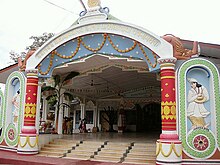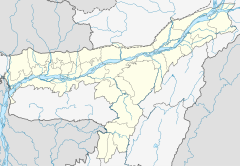This article needs additional citations for verification. (July 2018) |
| Dhekiakhowa Bornaamghar | |
|---|---|
 Gate of Dhekiakhowa Bornaamghar | |
| Religion | |
| Affiliation | Hinduism |
| District | Jorhat district |
| Location | |
| State | Assam |
| Country | India |
| Geographic coordinates | 26°28′N 94°11′E / 26.47°N 94.19°E |
| Architecture | |
| Creator | Madhavdeva[1] |
| Completed | 1528 (1450 Saka)[1] |
| Website | |
| dhekiakhowabornamghar.com/ | |
Dhekiakhowa Bornaamghar(Assamese: ঢেকীয়াখোৱা বৰনামঘৰ) is a naamghar in Jorhat district, Assam, India, that was established by saint-reformer Madhavdeva.[2][3] In 1528 (1450 Saka), Madhavdeva kindled an earthen lamp there, which according to the naamghar's managing committee has been burning continuously since then, being refueled with mustard oil by the priests.[4] It is located at Dhekiakhowa village of Jorhat district, 15 km towards the east of Jorhat city 3.5 km away from National Highway 37.[1] It is called a Bornaamghar because of its historical association and large campus.
The naamghar is situated in a complex of facilities spread over 13 bighas of land. The naamghar and other facilities are maintained by a managing committee with donations from devotees. Besides the maintenance of the complex, the managing committee sponsors various social and cultural programs.
There is an anecdote after the name of Dhekiakhowa Naamghar. Guru Madhavdeva after taking up the duty of reforming people and spreading the Ekasarana Naam Dharma came to stay in this small village. He took shelter for the night at the hut of an old woman, who served him rice with Dhekia Saak (Fiddlehead Fern), a very common wild vegetable. The old woman was very embarrassed to have served the Saint guru like this but he was immensely pleased by the dinner. So he started a naamghar there and given the responsibility of kindling the earthen lamp to the old woman. The naamghar was later known as Dhekiakhowa Naamghar.
A lot of visitors and devotees gather in the naamghar everyday, especially during the sacred month of Bhado (August–September), for this month being the Death Anniversaries of both the gurus Srimanta Sankardeva and Madhavdeva[5][6]
- ^ a b c Ahom, Mor (6 August 2011). "Dhekiakhowa Bornaamghar, Assam". MobME Wireless Solutions Private Limited. Archived from the original on 17 February 2013. Retrieved 2 November 2012.
- ^ "Dhekiakhowa Bornaamghar". Jorhat District, Assam.
- ^ "Dhekiakhowa Bornaamghar". Government of Assam. Archived from the original on 1 December 2020. Retrieved 3 February 2021.
- ^ "Alight for half a millennium". The Telegraph online.
- ^ "Tithi of Sri Sri Madhabdev". The Sentinel.
- ^ "Dhekiakhowa Bornaamghar". MCJ web-news Portal. Tezpur University.
